表示时间介词用法
时间前面的介词用法

时间名词前所用介词的速记歌年月周前要用in,日子前面却不行。
遇到几号要用on,上午下午又是in。
要说某日上下午,用on换in才能行。
午夜黄昏须用at,黎明用它也不错。
at也用在明分前,说“差”可要用上to,说“过”只可使用past,多说多练牢牢记,莫让岁月空蹉跎。
下面就时间概念的介词用法做一简要介绍和比较。
1.at表示时间概念的某一个点。
(在某时刻、时间、阶段等)。
at 1:00(dawn,midnight,noon)在一点钟(黎明、午夜、中午)These are our chief tasks at the present stage.这些就是我们现阶段的主要任务。
2.on1)表示具体日期。
They arrived in shanghai on May 25.他们在五月二十五日到达上海。
注:(1)关于"在周末"的几种表示法:at(on)the weekend 在周末---特指at(on)weekends 在周末---泛指over the weekend 在整个周末during the weekend 在周末期间(2)在圣诞节,应说"at Christmas?而不说"on Christmas?2)在(刚……)的时候。
On reaching the city he called up his parents.一到城里他就给父母打了一个电话。
3.in1)表示"时段"、"时期",在多数情况下可以和during互换,前者强调对比,后者强调持续。
in(during)1988(December,the 20th century)在一九八八年(十二月、二十世纪)I returned to Beijing in the middle of June.我是六月中回北京的。
但如果表示"在某项活动的期间",则只能用during。
表时间的介词用法
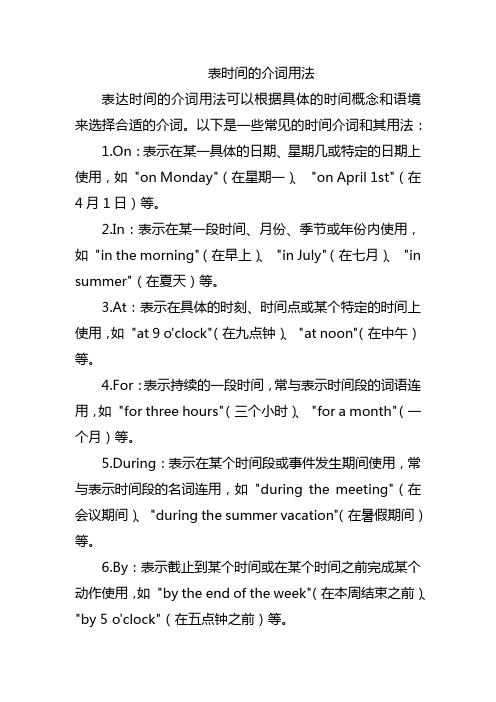
表时间的介词用法
表达时间的介词用法可以根据具体的时间概念和语境来选择合适的介词。
以下是一些常见的时间介词和其用法:
1.On:表示在某一具体的日期、星期几或特定的日期上使用,如"on Monday"(在星期一)、"on April 1st"(在4月1日)等。
2.In:表示在某一段时间、月份、季节或年份内使用,如"in the morning"(在早上)、"in July"(在七月)、"in summer"(在夏天)等。
3.At:表示在具体的时刻、时间点或某个特定的时间上使用,如"at 9 o'clock"(在九点钟)、"at noon"(在中午)等。
4.For:表示持续的一段时间,常与表示时间段的词语连用,如"for three hours"(三个小时)、"for a month"(一个月)等。
5.During:表示在某个时间段或事件发生期间使用,常与表示时间段的名词连用,如"during the meeting"(在会议期间)、"during the summer vacation"(在暑假期间)等。
6.By:表示截止到某个时间或在某个时间之前完成某个动作使用,如"by the end of the week"(在本周结束之前)、"by 5 o'clock"(在五点钟之前)等。
时间介词的用法总结
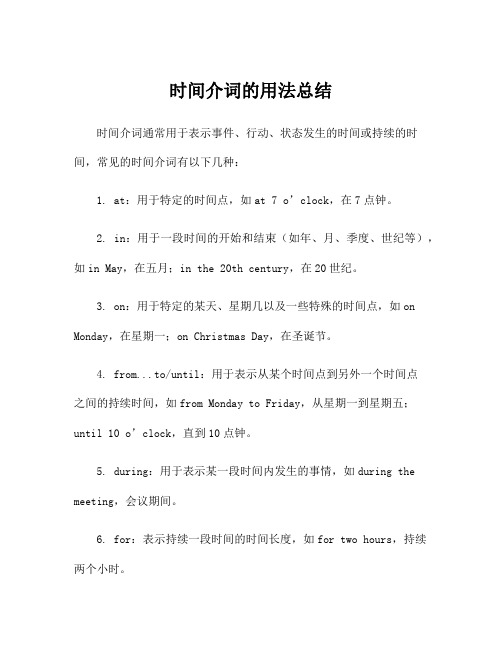
时间介词的用法总结
时间介词通常用于表示事件、行动、状态发生的时间或持续的时间,常见的时间介词有以下几种:
1. at:用于特定的时间点,如at 7 o’clock,在7点钟。
2. in:用于一段时间的开始和结束(如年、月、季度、世纪等),如in May,在五月;in the 20th century,在20世纪。
3. on:用于特定的某天、星期几以及一些特殊的时间点,如on Monday,在星期一;on Christmas Day,在圣诞节。
4. from...to/until:用于表示从某个时间点到另外一个时间点
之间的持续时间,如from Monday to Friday,从星期一到星期五;until 10 o’clock,直到10点钟。
5. during:用于表示某一段时间内发生的事情,如during the meeting,会议期间。
6. for:表示持续一段时间的时间长度,如for two hours,持续两个小时。
需要注意的是,有些时间介词在不同的情况下有着不同的含义,例如at在表示“在某个时间”的同时也可以表示“在某个地点”;in 在表示时间段的同时也可以表示“在某个地点”等等。
另外,虽然时间介词的用法比较固定,但还是要注意具体的语境和句子结构,尽可能准确和恰当地使用时间介词。
介词in,on,at时间的用法总结
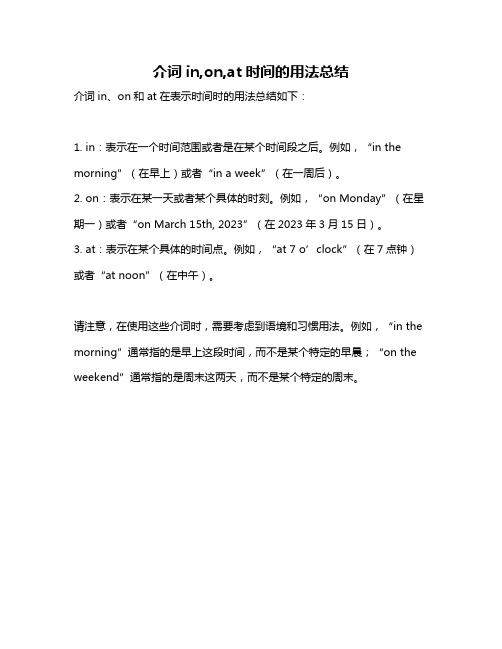
介词in,on,at时间的用法总结
介词in、on和at在表示时间时的用法总结如下:
1. in:表示在一个时间范围或者是在某个时间段之后。
例如,“in the morning”(在早上)或者“in a week”(在一周后)。
2. on:表示在某一天或者某个具体的时刻。
例如,“on Monday”(在星期一)或者“on March 15th, 2023”(在2023年3月15日)。
3. at:表示在某个具体的时间点。
例如,“at 7 o’clock”(在7点钟)或者“at noon”(在中午)。
请注意,在使用这些介词时,需要考虑到语境和习惯用法。
例如,“in the morning”通常指的是早上这段时间,而不是某个特定的早晨;“on the weekend”通常指的是周末这两天,而不是某个特定的周末。
表示时间的介词用法
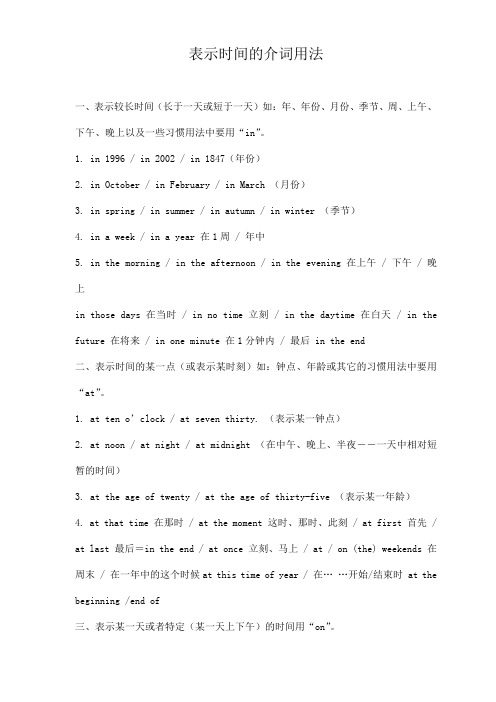
表示时间的介词用法一、表示较长时间(长于一天或短于一天)如:年、年份、月份、季节、周、上午、下午、晚上以及一些习惯用法中要用“in”。
1. in 1996 / in 2002 / in 1847(年份)2. in October / in February / in March (月份)3. in spring / in summer / in autumn / in winter (季节)4. in a week / in a year 在1周 / 年中5. in the morning / in the afternoon / in the evening 在上午 / 下午 / 晚上in those days 在当时 / in no time 立刻 / in the daytime 在白天 / in the future 在将来 / in one minute 在1分钟内 / 最后 in the end二、表示时间的某一点(或表示某时刻)如:钟点、年龄或其它的习惯用法中要用“at”。
1. at ten o’clock / at seven thirty. (表示某一钟点)2. at noon / at night / at midnight (在中午、晚上、半夜――一天中相对短暂的时间)3. at the age of twenty / at the age of thirty-five (表示某一年龄)4. at that time 在那时 / at the moment 这时、那时、此刻 / at first 首先 / at last 最后=in the end / at once 立刻、马上 / at / on (the) weekends 在周末 / 在一年中的这个时候at this time of year / 在……开始/结束时 at the beginning /end of三、表示某一天或者特定(某一天上下午)的时间用“on”。
时间介词(at, in ,on) 的用法
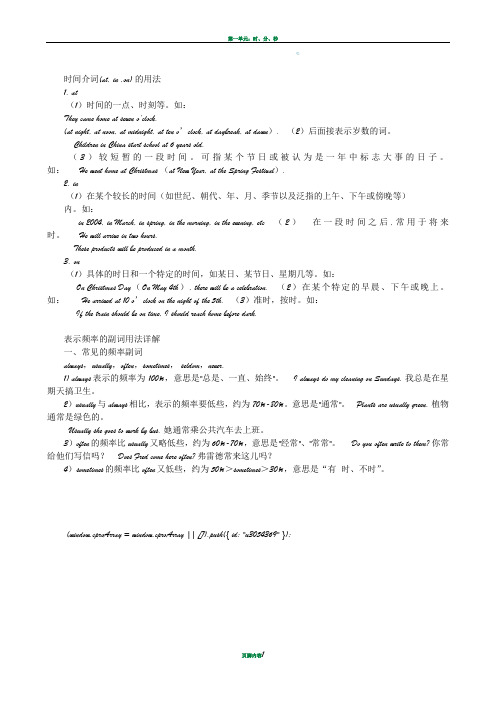
时间介词(at, in ,on) 的用法1. at(1)时间的一点、时刻等。
如:They came home at seven o’clock.(at night, at noon, at midnight, at ten o’clock, at daybreak, at dawn). (2)后面接表示岁数的词。
Children in China start school at 6 years old.(3)较短暂的一段时间。
可指某个节日或被认为是一年中标志大事的日子。
如: He went home at Christmas (at New Year, at the Spring Festival).2. in(1)在某个较长的时间(如世纪、朝代、年、月、季节以及泛指的上午、下午或傍晚等)内。
如:in 2004, in March, in spring, in the morning, in the evening, etc (2)在一段时间之后,常用于将来时。
He will arrive in two hours.These products will be produced in a month.3. on(1)具体的时日和一个特定的时间,如某日、某节日、星期几等。
如:On Christmas Day(On May 4th), there will be a celebration. (2)在某个特定的早晨、下午或晚上。
如: He arrived at 10 o’clock on the night of the 5th. (3)准时,按时。
如:If the train should be on time, I should reach home before dark.表示频率的副词用法详解一、常见的频率副词always,usually,often,sometimes, seldom,never.1) always表示的频率为100%,意思是"总是、一直、始终"。
表示时间介词用法
What does Jim often do on Monday
Xiaoyan: I’ve got my fitness program from the gym for this
month. Which
Mary: ⑴
class do you have tomorrow, Xiaoyan
Xiaoyan: ToWmohrorow-Tuesday-I haven’t got a class. I do gym.
一般疑问句
简略回答
Was I…
Yes, I was.
No, I wasn’t.
Were you…
Yes, we were. No, we weren’t.
Was he/she/it… Yes, he/she/it was. No, he/she/it wasn’t.
Were we…
Yes, we were. No, we weren’t.
*注意:具体某天的上午、下午或晚上要用介词on,如: They will have dinner together on Sunday evening.
*注意:以下名词与介词的固定搭配: My children play in the street in the daytime. (在
白天) I can hear the cars at night. (在晚上) I go to my mother’s house at the weekend. (在周
比较级\最高级的规则及不规则变化
▪ 1 ---er/est ▪ Tall-taller-tallest, short-shorter-shortest ▪ 2. 以e结尾-r/st nice-nicer-nicest ▪ 3.重读闭音节,双写辅音字母-er/est ▪ thin-thinner-thinnest ▪ 4.已辅音字母+y结尾 去y变I-er/est ▪ busy-busier-busiest ▪ 5.多音节形容词—more/most ▪ Relaxed---more relaxed---most relaxest ▪ Note: good-better-best bad-worse-worst
时间介词_at_in_on_用法及练习
时间介词(at, in ,on) 的用法与练习【时间介词记法口诀】:at用在时刻前,亦与正午、午夜连,黎明、终止和开端,at与之紧接着相伴。
周月季年长时间,in须放在其前面,泛指一晌和傍晚,也要放在in后边。
on指特定某一天,日期、星期和节日前某天上下和夜晚,依然要在on后站。
今明昨天前后天,上下这那每之前,at、in、on都不用,此乃习惯记心间。
1. at后常接几点几分,天明,中午,日出,日落,开始等。
如:at five o’clock(五点), at down (黎明), at daybreak (天亮), at sunrise (日出), at noon (中午), at sunset (日落), at midnight (半夜),at the beginning of the month (月初), at that time (那时), at that moment (那会儿),at this time of day (在一天的这个时候)。
2. in后常接年,月,日期,上午,下午,晚上,白天,季节,世纪等。
如: in 2006(2006年),in May,2004 (2004年五月), in the morning (早晨/上午), in the afternoon (下午), in the evening (晚上), in the night (夜晚), in the daytime (白天), in the 21st century (21世纪),in three days (weeks/month)三天(周/个月)1. at+night/noon/dawn/daybreak/点钟(所指的时间小于天):at night( ) at noon( ) at down( )at daybreak( ) at7:30( ) at 7o’clock ( )2. in+年/月/季节/泛指某一天的上morning,下afternoon,晚evening(所指时间大于天):in 2004()in March()in spring()in the morning()in the evening ()in the afternoon()扩展:在一段时间之后。
时间介词on in at的用法
时间介词on in at的用法
时间介词是英语中非常常见的一类介词,它们用来表示时间。
其中,on、in和at是最基本的三个时间介词。
它们的用法如下:
1. on
on通常用来表示一个具体的日期,例如:on Monday(星期一)、on August 10th(8月10日)等等。
2. in
in通常用来表示一个时间段或某个月份/季节/年份,例如:in the morning(早上)、in July(7月)、in winter(冬天)、in 2021(2021年)等等。
3. at
at通常用来表示一个具体的时间点,例如:at 3 o'clock(3点钟)、at noon(中午)、at night(晚上)、at Christmas(圣诞节)等等。
需要注意的是,这些时间介词有时需要根据具体语境进行变化。
例如,如果我们要表示“每周三”,应该使用on,即on Wednesdays;而如果我们要表示“在2022年的春天”,则应该使用in,即in the spring of 2022。
总之,掌握这些时间介词的用法,能够帮助我们更准确地表达时间和时间段。
- 1 -。
时间介词at,in,on 的用法
时间介词(a t,i n,o n)的用法1.at(1)时间的一点、时刻等。
如:Theycamehomeatseveno’clock.(atnight,atnoon,atmidnight,atteno’clock,atdaybreak,atdawn).(2)后面接表示岁数的词。
ChildreninChinastartschoolat6yearsold.(3)较短暂的一段时间。
可指某个节日或被认为是一年中标志大事的日子。
如:HewenthomeatChristmas(atNewYear,attheSpringFestival).2.in(1)在某个较长的时间(如世纪、朝代、年、月、季节以及泛指的上午、下午或傍晚等)内。
如:in2004,inMarch,inspring,inthemorning,intheevening,etc(2)在一段时间之后,常用于将来时。
Hewillarriveintwohours.Theseproductswillbeproducedinamonth.3.on(1)具体的时日和一个特定的时间,如某日、某节日、星期几等。
如:OnChristmasDay(OnMay4th),therewillbeacelebration.(2)在某个特定的早晨、下午或晚上。
如:Hearrivedat10o’clockonthenightofthe5th.(3)准时,按时。
如:Ifthetrainshouldbeontime,Ishouldreachhomebeforedark.表示频率的副词用法详解一、常见的频率副词always,usually,often,sometimes,seldom,never.1)always表示的频率为100%,意思是"总是、一直、始终"。
IalwaysdomycleaningonSundays.我总是在星期天搞卫生。
2)usually与always相比,表示的频率要低些,约为70%-80%。
- 1、下载文档前请自行甄别文档内容的完整性,平台不提供额外的编辑、内容补充、找答案等附加服务。
- 2、"仅部分预览"的文档,不可在线预览部分如存在完整性等问题,可反馈申请退款(可完整预览的文档不适用该条件!)。
- 3、如文档侵犯您的权益,请联系客服反馈,我们会尽快为您处理(人工客服工作时间:9:00-18:30)。
4. 描述情感
*描述情感或感受,常用动词to feel. 如: --How are you feeling? --I feel much better. Thank you. 你现在感觉怎么样?我觉得好多了。谢谢你。 --How do you feel today? --I feel terrible. I’ve got a headache. 你今天感觉怎么样?我觉得很难受。我头疼。
Xiaoyan: I’ve got my fitness program from the gym for this month. Which Mary: ⑴ class do you have tomorrow, Xiaoyan? Xiaoyan: Tomorrow-TuesdayI haven’t got a class. I do gym. Who Mary: ⑵ do you do gym with? Xiaoyan: Nobody, I do two gym sessions on my own a week. when Mary: So, ⑶ are your classes? Xiaoyan: This month, I do aerobics on Saturdays and Tai Chi on Mondays. what Mary: And ⑷ do you do next month? Xiaoyan: I do three gym sessions, but I don’t do Tai Chi –there isn’t a class. Why Mary: ⑸ isn’t there a class? Xiaoyan: The trainer is on holiday. But it starts again the month after next. So, the month after next, I do two gym sessions again and I do Tai Chi. Mary: Well. Good luck! Enjoy yourself!
*动词to be的过去时的用法
动词to be 的过去时用于描述过去的经历(说 话时已结束的事情或已不存在的状态)。如: I was at the doctor’s yesterday. 昨天我去过 诊所。 She was a teacher in Italy last year. 去年她 在意大利当老师。 They were in France last month. 上个月他 们在法国。
注意:on Monday与on Mondays意义不完全相同。on Monday有两个意思,第一表示特指的某个星期一,第 二表示每逢星期一;而on Mondays只表示每逢星期一。
*注意:具体某天的上午、下午或晚上要用介词on,如: They will have dinner together on Sunday evening. *注意:以下名词与介词的固定搭配: My children play in the street in the daytime. (在 白天) I can hear the cars at night. (在晚上) I go to my mother’s house at the weekend. (在周 末) I go to my mother’s house on the weekend.(美式 英语) I play tennis at weekends. (每逢周末)
6. 描述经历 P178
What was…like?/How was….?可以用来询问 他人对所经历之事的总体感觉。如: What was the party like? How was the party? Note:描述天气 What’s the weather like in…? 谈论人的外貌和性格特征 What does he look like?他长什么样?(外 貌) What is he like? (性格)
* 描述情感的形容词中有一部分由动词的 -ing 形式和 -ed 形式 转化而来。前者通常带有主动含义,用来描述事件或某项 活动本身所具有的特征;后者通常带有被动含义,用来描 述人的感觉。 The lesson is interesting. 那堂课很有趣。 The students were interested in studying English. 学生们 对学习英语感兴趣。 常用的此类形容词有: boring 令人厌倦的 bored (by) 因……而厌倦 exciting 令人兴奋的 excited (about) 因……感到激动的 worrying 令人担心的 worried (about) 因……担心的 tiring 引起疲劳的,累人的 tired (from) 因……疲惫的
7. 重点词汇
certainly include pay medical address occupation monthly agree to regulation signature suit list show sb. around fitness session cancel recommendation training choose make an appointment cash opportunity serve pick up presentation boring exciting worrying frightening tiring bored (by) excited (about) worried (about) frightened (about) depressed (by) tired (from)
3. 社交书信 P174
写信人姓名 地址 日期 Dear xx, ---------------------------------------------------------------------------------------------------------------------------------------------------------------------------------Yours sincerely, xxx
1. 表示时间的介词
*at 表示“在 …… 时刻”,与具体的钟点搭配使用, 如: We open at seven and close at ten. We start work at 8 o’clock. *from…to 表 示 “ 从 …… 到 ” , from…till 表 示 “ 从 …… 直 到 …… 为 止 ” , between…and 表 示 “在……之间”, 都用于表示某一段时间。如: We open from Monday to Friday. (我们星期一到星 期五都开放。) We open from May till September. (我们五月份开 始开放,直到九月份闭馆。) We open between seven and ten. (我们开放时 间为七点到十点之间。)
2. 时间表达法
this/next/the…after 可以表达时间,如: this month(这个月)/next month(下个月)/the month after next(下下个月) this Tuesday/next Tuesday/the Tuesday after next this week/next week/the week after next this year/next year/the year after next today/tomorrow/the day after tomorrow 注意:the next day 表示 过去 的时间,意为 “第二天”而不是明天,常常用在间接引语里。
比较级\最高级的规则及不规则变化
1 ---er/est Tall-taller-tallest, short-shorter-shortest 2. 以e结尾-r/st nice-nicer-nicest 3.重读闭音节,双写辅音字母-er/est thin-thinner-thinnest 4.已辅音字母+y结尾 去y变I-er/est busy-busier-busiest 5.多音节形容词—more/most Relaxed---more relaxed---most relaxest Note: good-better-best bad-worse-worst
*on 表示“在 …… 时候”,与日期、星期搭配使用。如: I leave on Monday 25th November. He plays football on Friday. *in表示“在……期间”,与具体的年代、月份、季节或 一天中的某个时段搭配使用。如: The postman comes in the morning(s) and in the afternoon(s).邮递员每天上午和下午来送信。
2. 疑问词
Who, whom, whose, which, what, where, when, why, how(how many, how much, how old, how long, how far, how often, how soon, how big) Who---主格 Who is he? Whom---宾格 Whom do you talk with? Whose---定语 Whose book is this? Which---哪个,哪些(有限定的选择范围) Which museum do you want to go to? What --什么,什么样的(没有限定的选择范围) What does Jim often do on Monday?
1. 形容词的比较级P188
1.表示等级比较时用as+原形+as Eg: London is as busy as Shanghai. 表示不如时用not so /as +原形+as Eg: Lily isn’t so tall as lucy.=Lily is shorter than Lucy.=Lucy is taller than Lily. 2.二者比较常用形容词的+than 结构 3. 比较级前常用修饰语a bit/a little/much/a lot等词语来修饰 Eg: The Changjiang River is much longer than the Yellow River. 4. 三者或三者以上比较用最高级 Eg: She is the tallest girl in our school.
